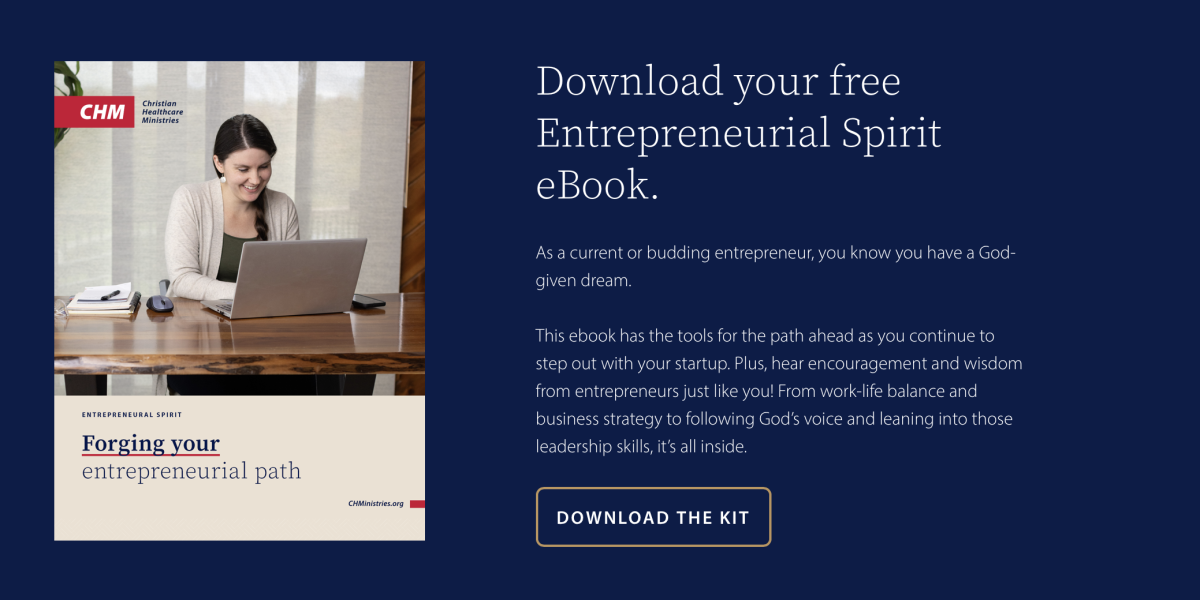
The (Christian) entrepreneurial toolkit
When you’re building a house, you need a set of blueprints and the right toolset. Without the right materials and skills, the house will falter. It’s the same way with entrepreneurship. Whether you’re looking to start your own business, ministry, or online career, you need the right toolkit.
Entrepreneurship skills make all the difference, especially in such a competitive landscape. While it might seem daunting, developing a new skill set is within your reach.
Here are some specific areas you can sharpen and stretch.
Growth mindset
We often hear about the importance of growth and having a “new mindset,” but what is a growth mindset, and what does it actually do?
Having a growth mindset has to do with our thinking. For example, someone who views challenges as an opportunity for growth, rather than a setback, is demonstrating this viewpoint.
Romans 12:2 (NIV) says, “Do not conform to the pattern of this world but be transformed by the renewing of your mind. Then you will be able to test and approve what God’s will is—His good, pleasing and perfect will.”
Individuals who exemplify this skill believe their abilities can be continually developed. Their circumstances, past thinking patterns, talent, or available resources don’t define them. Instead, those things are just at the start line in the race of life.
In contrast, a fixed mindset is a perspective that never changes. It believes that no matter what happens, some aspects will never be developed. Stepping out of your comfort zones, putting in effort and hard work, or attempting to move forward is fruitless.
However, if you’re already an entrepreneur or if you’re thinking about taking the jump to developing entrepreneurial skills—you’re likely off to a great start. You’re already thinking differently than others in your field. Continue to stretch those muscles by embracing failure, seeking opportunities for learning, and accepting feedback from others.
Strategic thinking
Strategic thinking is a process or pattern of thinking oriented towards achieving attainable goals. Strategy involves careful planning, decision-making, and problem-solving skills. Without strategic thinking, an organization falls by the wayside, and plans started without realizing all the potential outcomes.
Examples of strategic thinking always include a vision. Starting with a strong vision sets the tone for every other piece of the entrepreneurial puzzle. Next, you must evaluate the investment, opportunity, impact, and results of the decision.
Writing out each of these steps in a brainstorming session can be helpful when evaluating new opportunities. While it’s impossible to know exactly how every piece will turn out, or what the impact and results will be, it’s helpful to think through all potential scenarios.
Unlike more traditional lines of work, entrepreneurship comes with its own unique set of challenges.
Networking
Learning how to network is crucial, especially for entrepreneurs. Business networking is an underrated and underdeveloped skill for many individuals.
If you’re feeling overwhelmed or don’t know where to start—start small! Local networking is the best way to make connections right where you are while boosting your confidence and career prospects. Look for groups to join or ask friends and fellow professionals for recommended contacts.
Another option is to reach out online to individuals currently working in the field you desire in order to ask:
- …if you can conduct an informational interview. Come prepared with a list of questions connecting both to your entrepreneurship journey and their experiences.
- …if you can stay in contact, and if there’s anyone else they’d recommend you reach out to. You never know where just one conversation might lead!
Christian networking isn’t uncommon, and as you develop your professional networking skills, you’ll find the right group of people who will cheer you on.
Professional development
Unlike more traditional lines of work, entrepreneurship comes with its own unique set of challenges. Planning, communication skills, and leadership skills are all put to the test. To reach your full potential and explore career opportunities, it’s important to prioritize professional development.
Professional development looks like:
- Mentorship: Find a mentor or role model who can guide you on your journey. As a Christian, look for someone who has a strong faith and relies on God for strength and wisdom. If you know someone who seems like a good fit—reach out and let them know that you’d like to be a mentee. Life itself is a learning experience.
- Taking courses: From accounting to communication and graphic design, an entire world of possibilities opens by learning new abilities.
- Building faithfulness: Being a faithful servant isn’t always easy, but with God’s help, it’s possible. He calls us to be good stewards of our resources, even when we must wait longer than we think for our dreams and plans to come to fruition. Stay connected to a local church and look for opportunities to serve.
Taking the leap of faith to become an entrepreneur isn’t easy. However, with opportunities for learning around every corner, you have limitless options to develop your skills.
In no time, you’ll be achieving success and navigating challenges with your handy “tool kit.”



